The Real Monster in Jaws Isn’t the Shark. It’s Capitalism.
Jaws isn't just an incredible movie. It’s a scathing, hidden indictment of how capitalism prioritizes profit over people.
As Jaws celebrates its 50th Anniversary this year, I wanted to write down some thoughts I have had for a while about how the movie is so much more than just what I consider to be the greatest movie of all-time.
Jaws is the film that created the summer blockbuster and completely changed the way studios approach movie releases. It’s the reason we even have the concept of a “summer blockbuster” in the first place. It’s the movie that made everyone afraid to go swimming and probably one of the most universally beloved thrillers of all time. It made me who I am today, and did the same for many others. But beyond all of that, Jaws is also one of the most biting (get it!) and effective critiques of capitalism ever put on screen, even if most people don’t immediately recognize it.
What makes Jaws so effective in its commentary is how well it hides that message beneath the surface. It isn’t like a lot of modern films that spells out their themes in bold letters and shove it right in the audience’s face. Spielberg didn’t make a movie that tells the audience exactly what to think. As most filmmakers would probably like to do before heavy studio interference steps in, he trusted viewers to pick up on different themes and form their own conclusions. So many films today seem like they’re afraid people won’t understand the point unless it’s shouted directly at them. There’s not a lot of trust in the audience’s ability to dig a little deeper. The lack of media literacy is a global issue right now. But Jaws doesn’t need to do that. The story is strong enough, and the writing is sharp enough. Everything is already there if you watch enough times and look at it from the right perspective.
When you do, you start to realize that every major decision in this movie is driven by money, either because someone is set to lose a lot of it, or someone is set to gain a lot of it. Every time someone makes a choice, it’s rooted in financial pressure and the pursuit of profit. All of the pain and suffering that happens as a result can be traced back to the simple fact that, for most of the people in charge, money matters more than lives.
Right at the start of the film, there’s a shark attack. A woman is killed in the water, her body torn to pieces and discovered the next morning. The coroner clearly calls it a shark attack. Brody wants to shut down the beaches to protect the public and figure out what’s going on, which is the obvious next step. When you have a violent, unexplained death in the ocean, the safest move is to temporarily close the beach and investigate further.
But that’s not what happens. After speaking with the mayor (who was being pressured by local business owners) the coroner changes his ruling. Suddenly, it’s not a shark attack anymore. Now it’s a boating accident. So the beaches stay open, and the death is swept under the rug.
This is a calculated decision to protect the island’s economy at the potential expense of human life. With the Fourth of July weekend approaching, the town leaders know how much money is on the line. They know that shutting down the beaches could ruin the season, and so they choose to cover it up. They choose to put every tourist, every swimmer, every child in danger, just so they don’t have to take a financial hit.
We’ve seen this happen in real life over and over again. Businesses and governments downplay danger because admitting the truth would cost too much. Whether it’s public health, environmental disasters, or unsafe working conditions, the pattern is the same. Profit comes first. Safety comes later, if at all.
After yet another person is killed, this time a child of a local family, the town reacts by putting out a bounty on the shark. That reward sets off a chaotic scramble, with dozens of unqualified locals heading out to sea, hoping to catch the killer and cash in on the reward. They bring dynamite. They crowd into boats. They treat it like a game, as if they were fishing in a tournament instead of trying to stop a rogue killing machine. When Hooper arrives, he tells Chief Brody he is about to have a lot more dead bodies on his hands because of the inexperience of the people heading out.
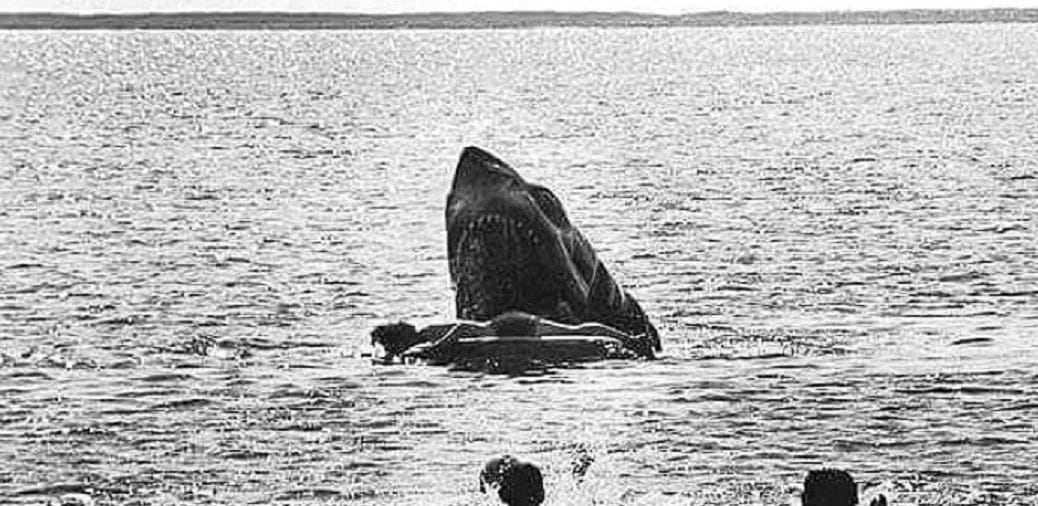
This moment is a perfect metaphor for how capitalism creates a false sense of opportunity. The promise of money draws people in, even if they aren’t remotely prepared. And of course, it ends badly for some of them. Ben Gardner, in particular, loses his life trying to hunt something he probably never had a chance of catching. But that’s what desperation does. That’s what happens when people are told that if they just work hard enough or take the right risk, they’ll be rewarded. Never mind that the odds are stacked against them. Never mind that they’re putting themselves in danger.
This part of the film shows how easily people can be manipulated by financial incentives. Even when there’s real risk involved, the money makes it feel worth it. And those in power, the ones who benefit the most, are more than willing to let the chaos unfold.
Eventually, a large shark is caught and the town celebrates. The mayor breathes a sigh of relief, declaring the beach to be safe again. The problem, according to them, is solved.
But Hooper, the marine biologist brought in to help, makes it clear that this is the wrong shark. The bite radius doesn’t match. The shark isn’t big enough. It isn’t the right species. He even opens up its stomach to prove a point! He’s using logic and science and relying on his education and experience to try and keep people alive. But of course, nobody takes him seriously. because listening to him would mean closing the beaches again. It would mean losing more money. So they pretend it’s over and ignore the science. Sound familiar?
This is one of the most frustrating moments in the movie, because it’s exactly what happens in real life when experts like Hooper are dismissed in favor of more convenient answers. When science becomes an obstacle to profit, the people in charge will often find ways to discredit or ignore it. Check out who fights against climate change research - you won’t be surprised. Just like the big corporations set to destroy the planet today, the mayor and the business owners in Jaws don’t care about accuracy or science. They care about the optics and the local economy. And they’re willing to risk more lives to protect their wallets.
When the town finally decides to take real action, they turn to Quint. He’s rough around the edges, but he knows exactly what he’s doing. He has the skills and experience, and he’s willing to do the job. But, as his right, he wants to be paid fairly for the work and for the risk he’s taking. At first, the town board laughs it off. They try cheaper options first, like letting the town loose on the seas to try and catch the shark for a reward.
This feels incredibly familiar, especially if you have ever done freelance work or been self-employed. In so many systems, the people who can actually solve the problem are either undervalued or ignored until it’s too late. Society will talk all the time about what a life is worth, and yet when faced with the actual cost of saving one, we hesitate. Quint is asking for what his work is worth, and nobody wants to pay it until they have no other choice.
Even then, it doesn’t end well of course. Quint dies on the job - the most American thing you can do. He gives everything to get the shark and earn his reward, and it kills him. The American Dream!
Quint’s death feels like a statement. He dies doing the job he was told to do, because others waited too long to act. He dies because his work was undervalued until it was the last resort. He dies because that’s what happens in a system where people are treated as tools and statistics, not as human beings.
Even the making of Jaws wasn’t immune to this. Spielberg faced serious pressure from the studio throughout production. We all know the story behind the messy production - the shark didn’t work, the shoot ran long, and the budgets inflated. Executives were ready to shut it down. Spielberg has said himself that he thought his career might be over if he didn’t deliver something fast, and with big box office returns.
And yet, all of those problems - the delays, the broken mechanical shark, the forced changes - are part of what made Jaws great. The decision to keep the shark hidden for most of the film wasn’t just a creative choice. It was a practical one, born out of necessity. And it worked. The tension it created is legendary.
Studio executives nearly ruined one of the greatest films ever made, simply because they were worried about the budget and its profitability. The movie that redefined cinema almost didn’t exist, because the numbers didn’t line up. This is more common now than ever before with algorithms and AI models deciding what gets made based on data instead of trusting artists. Of course, every business has to make money, or we wouldn’t get any films. But sometimes in the business of art, you have to trust the artists, and luckily this time, they did.
The real enemy in Jaws isn’t the shark. The shark is just nature doing what nature does. It isn’t malicious. It isn’t greedy. It doesn’t lie. It just exists.
The real villain is the system that allows people to ignore danger, silence experts, risk lives, and chase money at any cost. The mayor, the business owners, the local leaders - they’re the ones making the deadly decisions. And they’re doing it to protect profit. They’re acting this way because capitalism taught them that profit is the only thing that matters, even if it jeopardizes the people around them.
The more you watch Jaws and view it through this anti-capitalist lens, the clearer it becomes. It’s not just a monster movie. It’s not just a suspense film. It’s a story about what happens when money takes priority over human life. And it’s just as relevant today as it was in 1975.


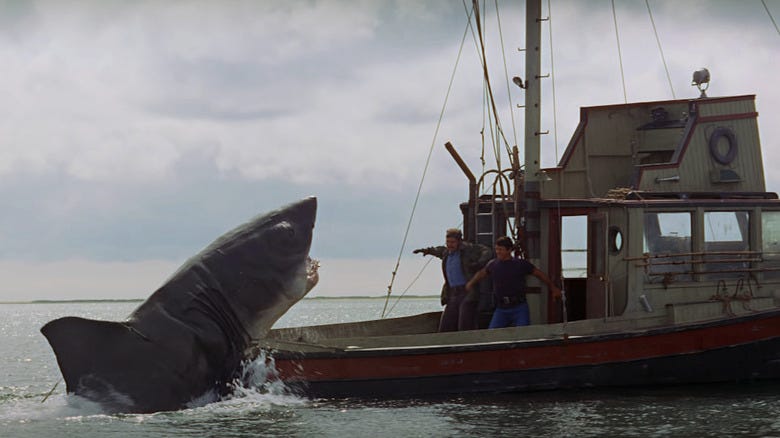
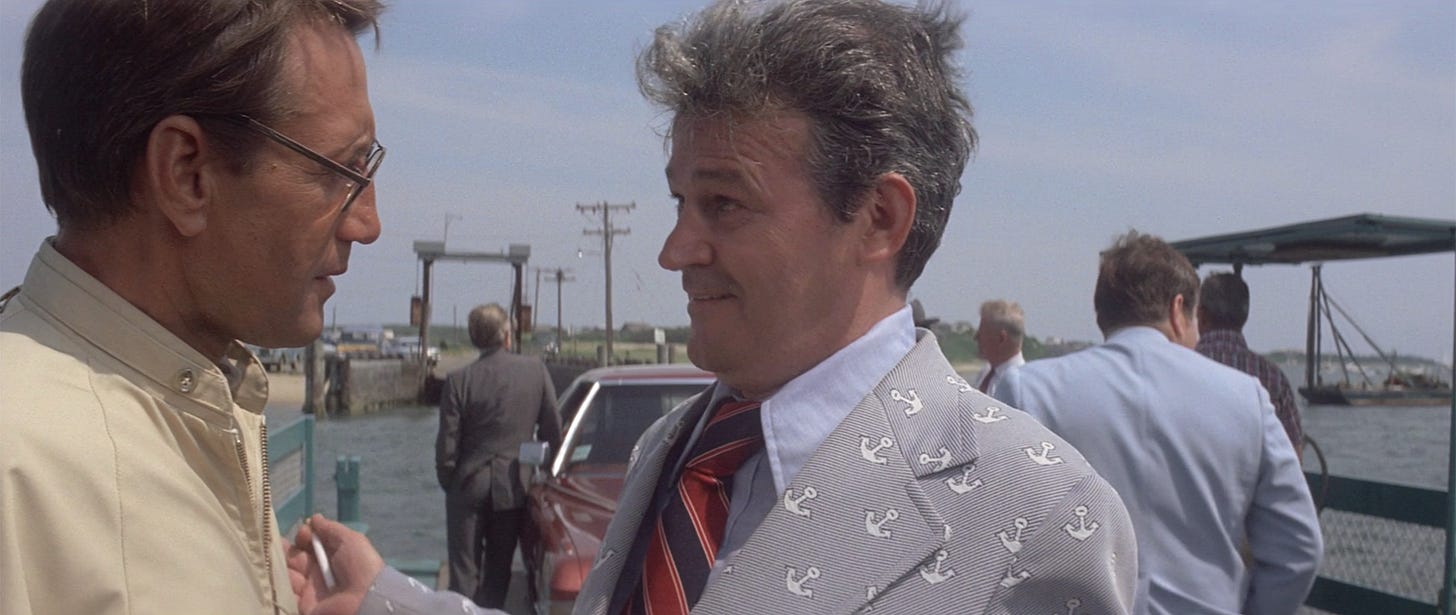
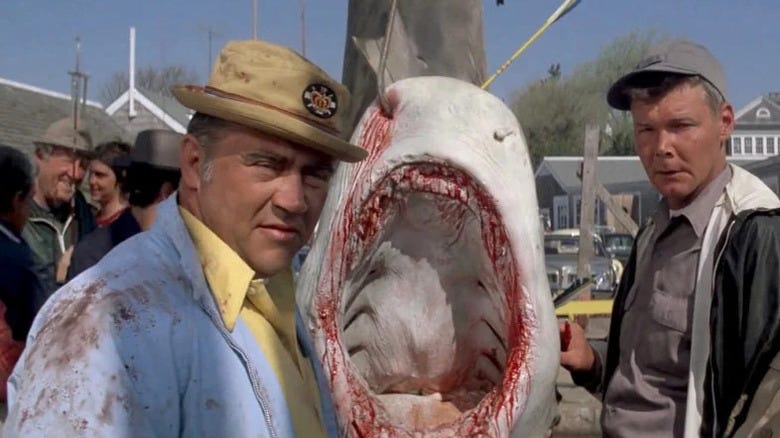
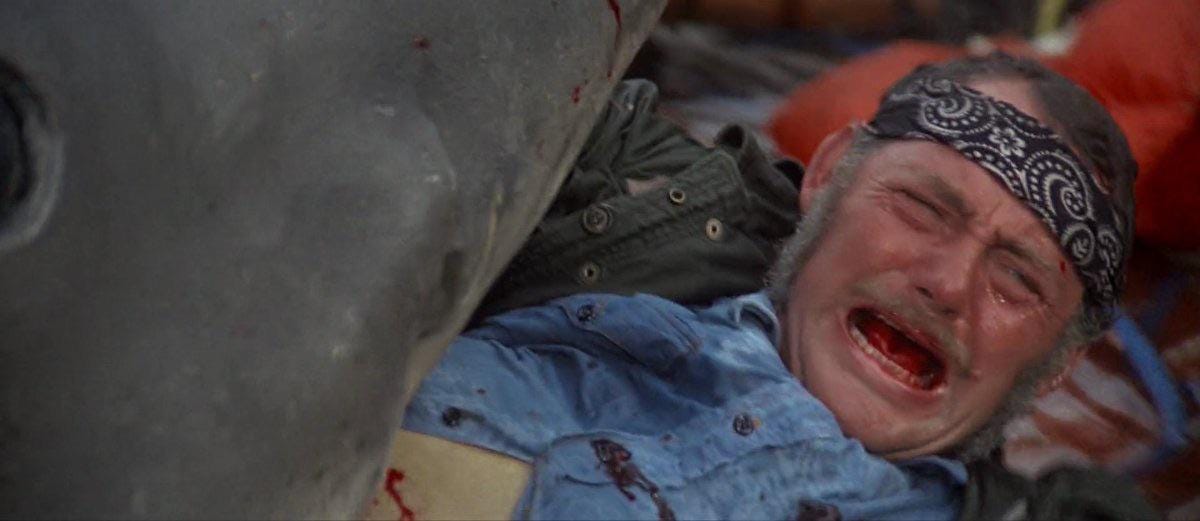
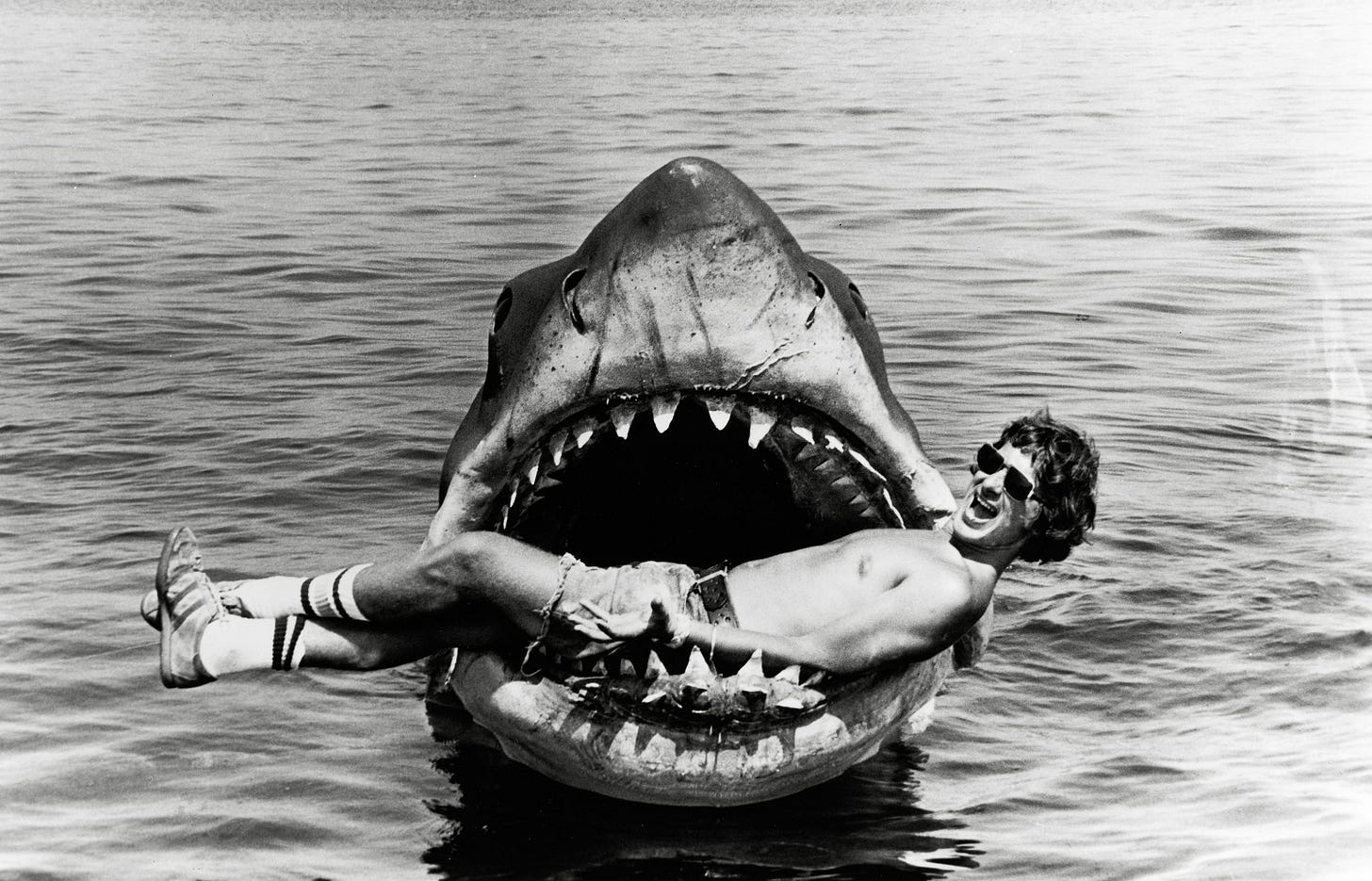
This is amazingly well written. Thank you.
That was an excellent analysis of the underlying message of Jaws. Greed never turns out well for the vast majority of people. When I watch Jaws again, I will keep your insight in mind.